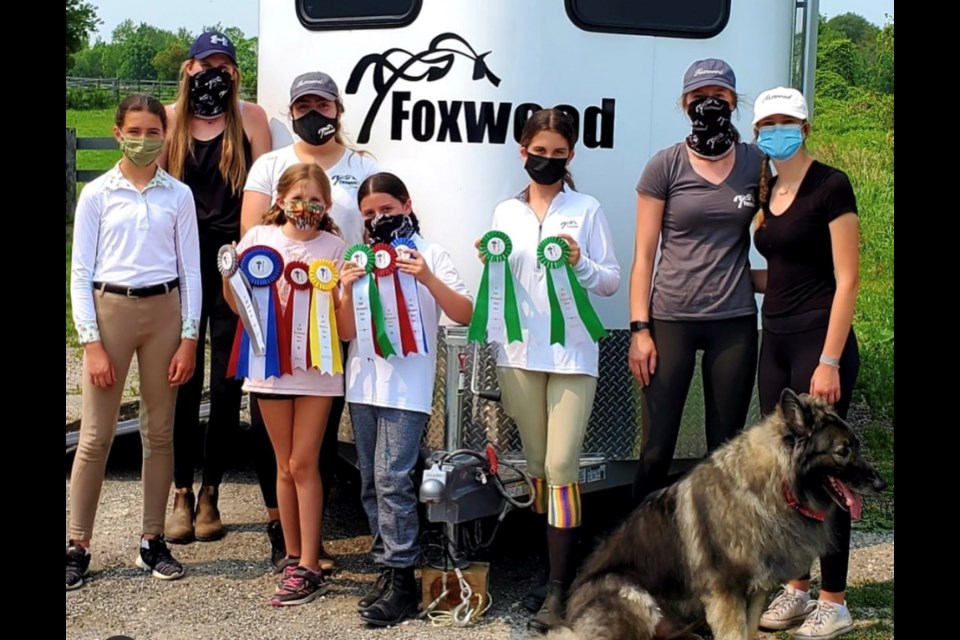Foxwood Farm's show teams have had a busy summer preparing for competitions across the province in hopes of gaining a spot at the Silver Series playoffs next month.
The series will take the top 48 riders from area divisions in bronze, silver, and gold levels to compete in Rockwood, Ontario at the end of September.
"It's a huge series," said Foxwood Farm owner and team coach, Robyn Feer. "It's a little higher rated show, they are competing against riders from all over Ontario."
Freer says it's been wonderful to see her young riders grow and develop their skills over the past few months.
Foxwood Farm has two show teams: competitive and development. There are 12 riders on the competitive team, and four on the development.
"Our development team is for kids or riders who haven't been riding that long," explained Freer.
The competitive team has a higher skill level and rides at least three times per week at the farm.
The pandemic has been a positive for the horse riding industry, with many looking for outdoor activities.
"I think because it's still considered outdoors, and not as confined as a dance studio or gym," said Freer.
"It's very therapeutic," added competitive rider Thea Fuller. "It's rewarding," she said, noting it also helps her to set goals in all aspects of life.
Tryouts for the competitive team are usually held in September, but because of a late-season start due to COVID restrictions, they will be held in October this year.
"It's something to strive for, it's a goal," said Freer about riding with the competitive team.
Freer and fellow coach, rider Denis Sweeney select the riders for the competitive team and determine which horse is best suited for each rider.
The farm will be adding an extension to their barn this month, which will give riders and their horses more space to learn and practice, and give visitors and spectators a new cozy lounge to watch the riders from.
Freer hopes to have the new barn built and ready by the end of October.
"It just gives us more space," she said.
"The higher the level of competition, the more they ride," explained Freer. "On average the A-circuit horses get ridden five to six hours per week."
Braiding is part of the competition "look", along with proper uniform for riders, including beige pants, riding boots, and jacket.
In the hunter ring, you can be judged on the horse's movement, their manners, and way of going.
Equitation classes are judged on the rider, looking at the rider's position, form and posture.
The judging system for hunter can be subjective, says Freer, similar to skating and gymnastics.
"As a coach sometimes it's very hard for me to explain to my students if they don't pin in a certain class," she said. "It really does depend on the judge."
She says as the riders advance to higher levels of competition, they become more familiar with the judges and give them an advantage in knowing what they look for.
"It gives you an idea how to ride at the show," she said.
A typical show day for riders and coaches begins the day for competition, with prep work.
The day before a show the riders will come to the barn, have a quick, light ride with the horses, then bathe them.
A braider will come in to braid the horses' manes and tails.
Riders are responsible for cleaning up all their tack (equipment) including saddles, reins, stirrups, bridles, and halters.
The riders then load their tack into a trailer, along with hay and water for the horses.
"I send out a list to everybody four days before (competition), everything they need to bring to the show, the riders are responsible for bringing everything: their helmets, their show jackets, their boots, their whips," said Freer.
The team meets at 6 a.m. at the farm on show day. The horses are loaded into the trailers and the team arrives at the competition one hour before the show starts.
"It gives riders a bit of time to look at the ring, look at their courses, get the horses settled," said Freer, "Give them time to chillout."
The team always takes extra helpers and grooms who assist riders in getting their outfits on and get horses tacked up for showtime.
While it can be an exciting day, Freer acknowledges that shows are not for every rider and not for every horse.
"It can be very stressful," she said. "It does take a special kind of horse to be a show horse."
Freer says the riders have to be in a certain mindset when they go to a show, and that it isn't always about "winning."
"The expectation when we go to a show is never that you have to win a ribbon. The expectation is to take the goals that you set for yourself and reach those goals on that day," she said. "You still have to have a competitive component but the emphasis is never on winning or having to achieve a higher level than you think you're ready for."
She wants it to be a positive experience for all riders.
"For competitive riders, it gives them something to work towards, and whether they achieve that goal at the first horse show, or second horse show or by the end of the season, it gives them something to work towards and that's a positive experience in itself," she said.
Competitive show team members:
Liv Dallaire
Claire Sturgeon
Bianca Caracoglia
Alex Cartwright
Thea Fuller
Charlotte Coons
Jade Brown
Sara Hales
Kenzie Wells
Mack Turco
Jacquie Bapooji
Aislynn Kell
Jaime Kilfoyle
Development show team members
Ireland Fleming
Madison Mason
Emily Ann Dufour
Show coaches
Robyn Freer
Denis Sweeney



